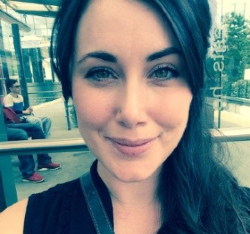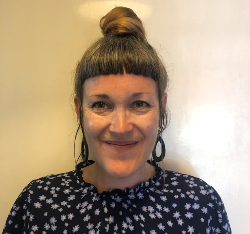“It’s had real impact – especially with the families. My relationship with the family is completely different.”
Oxfordshire County Council social worker Karina Boorer is discussing the impact of the family solutions plus model implemented in November of last year across the county.
Two aspects of the model – which is similar to the family safeguarding approach pioneered in Hertfordshire – stand out, she says: firstly, families work with one social worker from assessment through any subsequent intervention, while secondly this social worker is backed up by “adult-facing practitioners”, who are able to help families address the root causes of the problems impacting on their children.
Previously, Oxfordshire, like many councils, had separate assessment and intervention teams, meaning families had to be handed over from one practitioner to another if they needed longer-term support.
‘The family know you are going to be with them through the process’

Karina Boorer, social worker
“The biggest change has been not having that handover. Handing it over meant that you were starting from scratch,” Karina continues. “From the very beginning you are working with the family and they know you are going to be with them throughout that process. You can build a rapport with one social worker so that’s been the hugest change.”
The adult-facing practitioners are specialists in substance misuse, mental health and domestic abuse who are fully integrated into Oxfordshire’s 17 locality-based family solutions plus teams.
“The number of families that are struggling with addiction, where there are unhealthy relationships or mental health problems – every single family we work with there’s always been some aspect of that,” Karina adds. “It’s really difficult to outsource to get those services, as you have to go through different processes. Now we’re all working together and we are creating a team with the same goal, to help families get the best outcomes they can.”
There is a second benefit for social workers, she says.
“The accountability is not all on me, to make things work. You are part of a larger team, a larger system.”
Collective accountability
This collective accountability for families is expressed through a shared electronic workbook, in which all the practitioners involved type up their case notes, and the group supervision sessions they share.
Team manager Jonny Bradish, who supervises these sessions, says: “One of the key benefits I see is drawing that expertise into that one place so we can reflect and discuss things together – to share knowledge, skills and accountability in terms of good decision making and action planning.”
Because all of the practitioners will have updated the workbook before the session, managers do not have to spend time during supervision fact-finding. This means they can move straight to reflection and analysis, says Laura Clements, head of service, family solutions plus, for the north and south of the county. It also benefits practitioners, says Jonny.
“From a practitioner’s point, the workbook means you can see live what other people involved are doing,” he says. “You don’t have to wait for a supervision in the future to understand what’s happening for your family. For a manager, it feels like, as a team, we have a really good grip on what’s going on. Group supervision is the icing at the end to create an action plan for the next period of work.”
From an adult-facing practitioner’s perspective, Anna Lamb, a drug and alcohol recovery worker, says: “I really like the group-based supervision. It feels like we’ve each got our own focus but it all forms part of that larger piece of work. When we do come together there’s that shared professional curiosity. It’s not just one agency. We think about as a group what’s best for that family. That really helps with the decision making and assessment outcomes.”
Anna, who is employed by social enterprise Turning Point but fully integrated into the FSP service, also echoes Karina’s point about the value of multi-disciplinary working: “There’s also less delay, whereas previously where there may be a bit of a wait when you request something and a social worker has to talk to their manager. It’s a really timely way of updating and making sure everyone’s aware of what’s going on for those families. There’s less formality in referring from one agency to another so it’s a bit more streamlined.”
Group supervision in action
Recovery worker Anna Lamb and social worker Rebecca Trevelyan recently worked together with a family where a mother had drug and alcohol problems and her daughter had had to be placed in a children’s home.
Recently, they decided that the daughter needed to stay in the children’s home, rather than return home, and needed to consider how they relayed this news to both.
“It was really helpful having Anna in group supervision,” says Rebecca. “Her key worker from the residential home attended. It was really interesting listening to Anna about how the mother was behaving and from the key worker about how the child is. They both can’t handle being challenged.”
Assistant team manager and supervisor Lizzie Baker adds: “In that moment we were all seeing those links. One of the things we were hypothesising was that the mother reverts to being a teenage version of herself and her daughter is now a teenager. We look at what are the triggers for the mother and might they be the same for the daughter.
So having Anna, the residential home worker and Rebecca mulling that over means we could consider how can we tell her this piece of information and how can we tell mum about our plan. What’s really good when you have these adult-facing practitioners here is that you have a constant reminder of the other people involved. When we talk about things not going so well we have parents who feel they’ve not had the opportunity to be heard. But when you have adult-facing practitioners you have everyone in mind when you are making those plans.”
As important as the practice dimensions of the model is the infrastructure around it. There is a team of administrators who record group supervision – “so managers or social workers are not scribbling but are free to speak”, says Delia – while each team also includes personal assistants, to free up social workers for direct practice, and family support workers, who do direct work with children.
Meticulous planning
Planning for the implementation of the model started in 2019, backed by £5m in additional investment in children’s services, designed to make caseloads manageable for social workers and increase the time they had for direct work with families. The approach to implementation has been focused on getting things right and ensuring buy-in from practitioners, rather than rushing ahead.
Head of service for family solutions plus central Delia Mann says: “For the last 18 months, Laura and I

Laura Clements, head of service
have been focused on the training. We started with values, language, how things land for children and families. It was important to take people with us – we talked about why we were doing it. The ‘why’ was very important – this was a restructuring that was about evolving to a better form of practice.”
Practitioners appreciated this approach, says Karina. “Delia and Laura have been really good about allowing that space,” she says. “There were lots of conversations within the team – even I was at a couple of meetings where people said ‘seriously, I’m not sure about that’. It was that open culture where people were allowed to talk about it. Without that time, I don’t think it would have been as successful. It’s a huge restructuring when you think about assessment and longstanding teams. Those are two different teams and two different mindsets.”
Karina was on maternity leave when the model was finally implemented and came back with it in place.
“For me it’s been exciting – to come back to work and be rejuvenated.”
Are you interested in working in family solutions plus in Oxfordshire? Find out more here.
You can also join Oxfordshire for an online recruitment event on Monday 14 June from 12.00-1.30pm. You’ll be able to meet members of the family solutions plus teams and find out more about how the model is improving outcomes for children and families and changing the way social workers work with families, and the positive impact that has on their day-to-day work.
Sign up to the event here.




 Facebook
Facebook X
X LinkedIn
LinkedIn Instagram
Instagram